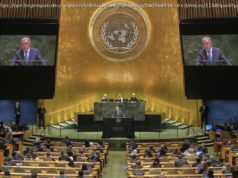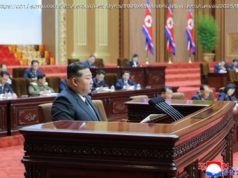The main suspect in the deadly 2012 attack on the U. S. diplomatic mission in Benghazi, Libya, is set to appear in federal court on Monday.
WASHINGTON – More than three years after his dramatic capture by U. S. special operations forces in Libya, Ahmed Abu Khatallah is set to stand trial Monday in federal court as the chief suspect in the deadly 2012 attack on the U. S. diplomatic mission in Benghazi, Libya.
The trial of the alleged militant, held in an Alexandria, Va., detention center since his arrival in the U. S., has been long shadowed by the debate over how to try terror suspects: prosecuting them like criminals in civilian courts or by military tribunals at the U. S. detention center at Guantanamo Bay, Cuba.
Seized during the Obama administration, Khatallah was transferred to federal custody following questioning aboard a Navy ship. President Trump and Attorney General Jeff Sessions, however, have vowed to direct future enemy combatants to Guantanamo Bay.
Here are five things to know before the trial begins Monday before U. S. District Judge Christopher Cooper in D. C. federal court.
More:
Khatallah is accused of being the mastermind in the Benghazi attack that killed U. S. Ambassador Christopher Stevens and three others. It was the first time since 1979 that a U. S. diplomat was killed on the job.
Stevens was visiting Benghazi when — on the same day as attacks on U. S. diplomatic outposts around the Middle East over a anti-Muslim video — the consulate was attacked by Islamist extremists. Members of the nearby CIA complex came to assist in the two attacks that occurred eight hours apart.
Khatallah is accused being the leader of the attacks, which occurred on the 11th anniversary of the 9/11 attacks. Three other U. S. government personnel — Sean Smith, Tyrone Woods and Glen Doherty — were also killed in the assault.
The attack prompted a congressional inquiry that engulfed then-secretary of State Hillary Clinton over whether the Obama administration lied about the attack. National security adviser Susan Rice told television interviewers the attack was part of the anti-video demonstrations several days after the White House recognized it was a separate terror attack. Questions about the government’s response to Benghazi also shadowed Clinton’s failed presidential bid.
Khatallah was seized June 15,2014, as part of a secret operation involving U. S. troops and law enforcement personnel at the suspect’s home just south of Benghazi. Although Khatallah had generally not concealed his whereabouts, officials said he had become more careful in the months following the 2013 capture of alleged al-Qaeda member Anas al-Libi in Tripoli, Libya, in connection with African embassy bombings in 1998.
The circumstances surrounding his capture proved controversial for the Obama administration and remain a point of contention in the current court proceedings.
Following his arrests, Khatallah was whisked to the brig on a Navy ship, which took nearly two weeks to cross the Atlantic Ocean. His lawyers have argued the journey was deliberately slowed to allow investigators more time to interrogate the suspect.
For the first five days on the ship, Khatallah was subjected to interrogation without being read his rights due a civilian arrested for a crime.
After a two-day break from the interrogations, a new team of interrogators with the FBI read Khatallah the Miranda warning.
Unclear. At one point during the court case, Khatallah’s lawyers fought to have him brought back to Libya, claiming that the U. S. violated the Constitution by holding him on the ship without reading him his rights.
The judge accepted the government’s argument for transporting the suspect by ship and also found Khatallah’s Miranda waiver had been voluntary.
The government claimed its decision to transport Khatallah by ship was due to the diplomatic and military complications a flight would have caused. As for the slow pace of the journey, the U. S. said there was unrelated trouble the vessel was experiencing.
Khatallah faces 18 charges, including giving support to terrorists, murder and conspiracy, according to court documents.
In October 2014, Khatallah pleaded not guilty. He has claimed that he was working as a construction contractor, having abandoned the militia he once led.
However, a Libyan witness interviewed by the Associated Press after the attack said Khatallah was at the scene of the attack and directed fighters.
The Justice Department announced last year that prosecutors would not seek death, so the maximum the 46-year-old could face is life in prison.
The trial begins Monday at 9 a.m., but there were a few notable pretrial rulings that will restrict the presentation of some evidence.
Last month, U. S. District Judge Christopher Cooper said the jury cannot be provided evidence that Khatallah allegedly threatened to kill one of Stevens’ successors after U. S. officials seized another militant in Libya in 2012.
Cooper also banned prosecutors from presenting evidence that Khatallah told his confederates to kill an American teacher in Libya.
The judge said he wanted jurors to examine the concrete proof which could link him to the specific Benghazi assault — and not be swayed by other stories that could speak more broadly about Khatallah’s character.
– Contributing: Kevin Johnson






